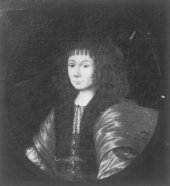Anna Pogwisch
Anna Pogwisch (born Rantzau, born June 2, 1634 in Kiel , † December 27, 1722 in Weißenhaus ) was a German noblewoman and patroness .
Life
On the maternal and paternal side, Pogwisch comes from the noble family of the Rantzau . In 1665 she married Bartram von Pogwisch (1631–1672) on Farve and Weissenhaus - with him the Doberstorf line of the Holstein nobility of Pogwisch died - who died seven years later at the age of forty. The marriage remained childless. She set herself a permanent monument with charitable and representative foundations. The Nikolai Church in Kiel they donated their own epitaph . On January 25, 1723, she was buried at the side of her husband in the Weissenhausen burial chapel in Kiel. The Weißenhausen burial chapel was demolished during the renovation of the Nikolaikirche in the years 1878 to 1884. It was not until 1972 that the coffins of Bartram and Anna Pogwisch were found during road works. Anna Pogwisch's bones were transferred to the Eichhof park cemetery .
In 2001, in memory of Anna Pogwisch, the Kehdenstrasse / Faulstrasse car park in Kiel was given the name Anna-Pogwisch-Platz.
Individual evidence
- ↑ a b Tillmann, Rosenplänter: Pogwisch, Anna. in: Kiel Lexicon. Wachholtz Verlag, 2nd edition, 2010, ISBN 978-3-529-02556-3 .
- ↑ a b Hans-G. Hilscher, Dietrich Bleihöfer: Anna-Pogwisch-Platz. In: Kiel Street Lexicon. Continued since 2005 by the Office for Building Regulations, Surveying and Geoinformation of the State Capital Kiel, as of February 2017 ( kiel.de ).
| personal data | |
|---|---|
| SURNAME | Pogwisch, Anna |
| BRIEF DESCRIPTION | German nobleman and patroness |
| DATE OF BIRTH | June 2, 1634 |
| PLACE OF BIRTH | Kiel |
| DATE OF DEATH | December 27, 1722 |
| Place of death | Weissenhaus |
